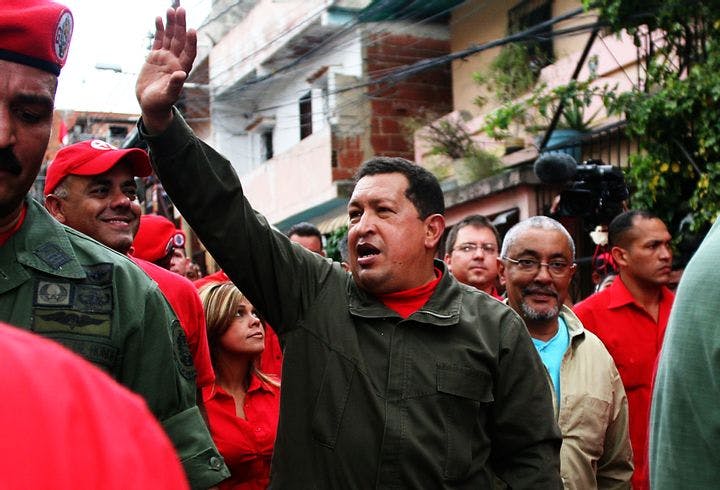Summer 2009
Saint Chávez
– The Wilson Quarterly
Venezuelan president Hugo Chávez has attached himself like glue to the nation's secular saint, Simón Bolívar.
In Latin America, few Catholics take their religion straight, preferring to filter it through local patron saints or other intermediaries. Things are a little different in Venezuela, writes Enrique Krauze, the editor of the Mexican magazine Letras Libres. There, Catholicism is not as deeply ingrained as it is elsewhere in the region, and the intermediary is a secular hero, Simón Bolívar, “the Liberator.” And it is to the national cult of Bolívar that Venezuelan strongman Hugo Chávez owes much of his popularity.
In the 1810s and ’20s, Bolívar (1783–1830) and others led a series of military campaigns that freed Colombia, Ecuador, Peru, Panama, Bolivia, and his native Venezuela from Spanish rule. But Bolívar’s attempts to meld the newly independent states into a single country failed, and in 1830, having contemplated going into exile in Europe, he died of tuberculosis. In Venezuelan national mythology, reverence for the Liberator mingles with shame at having failed him—“treason,” as the cardinal of Caracas described it in 1980—creating what Krauze calls a “Bolívarian passion story.”
No Venezuelan has been more passionate in his adoration of the Liberator or more adept at appropriating the national obsession than Hugo Chávez. After his failed coup attempt in 1992, Chávez explained that “Bolívar and I want the country to change.” At meetings during his subsequent rise as a political figure, Chávez would set an empty chair for Bolívar at the head of the table; in Chávez’s “delirious universe,” according to Krauze, “only he could hear the voice of his invisible guest.” Chávez set himself up as the “High Priest” of the Bolívarian cult, and in his inaugural address after being elected president in 1998 spoke of the Liberator’s resurrection. (He has since been reelected twice.) Chávez’s followers have responded enthusiastically. “Bolívar lives, Bolívar is alive!” the crowds chant.
Chávez’s other great influence has been Georgi V. Plekhanov, the “father of Russian Marxism” and the author of The Role of the Individual in History (1898), which Chávez read as an army officer in the 1970s. In what Krauze calls an “idiosyncratic” reading of the book, Chávez interpreted it to mean that history “is the product of the collective being” and that he himself was an instrument of the collective—and thus essentially above judgment. (Chávez has said he is not a Marxist, which is a good thing, since Marx’s writing on Bolívar drips with contempt.)
“Chávez does not act like the president of Venezuela; he acts like its owner,” Krauze writes. His Sunday television show runs for a minimum of five hours and is filled with tall tales, dancing, and prayers.
For all the gaudiness of Chávez’s self-conception, however, his rule rests on material pillars, and they are imperiled. The country’s all-important oil export revenues may drop this year to less than one-third their 2008 level. The political opposition remains strong, and Venezuela has a deeply rooted civil society. Abroad, Chávez could find himself isolated if U.S.-Cuban relations warm under the Obama administration. But Chávez’s greatest weakness is his own exaggerated sense of himself. Krauze fears that he will tighten his dictatorial grip and look to Iran for support, adapting the template of his idol in Cuba, Fidel Castro. “And then Venezuela, as so many times in its history, will be plunged into blood.”
THE SOURCE: “The Shah of Venezuela” by Enrique Krauze, in The New Republic, April 1, 2009.
Photo courtesy of Flickr/Bernardo Londoy
